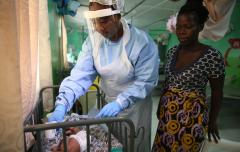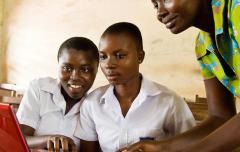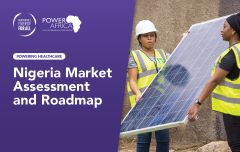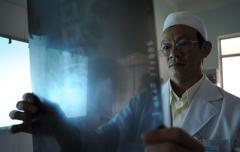New analysis finds USD 150 million needed to electrify more than 1,000 clinics and 1,745 schools in Sierra Leone
Sustainable Energy for All (SEforALL) launched a Market Assessment and Roadmap for Social Infrastructure in Sierra Leone this week, presenting it to key stakeholders during a roundtable meeting held in Freetown.
The assessment consists of two analyses, with one examining the electrification of health facilities and the other education. The analysis of the health sector shows that 38 percent of health facilities lack access to power. Those that have access to solar PV, community mini-grids, diesel generators, or the main grid also suffer from either insufficient power or unreliable power. As a result, it is estimated that more than 1,000 health facilities need either a complete power solution or a back-up solution, requiring an investment of approximately USD 64 million.
In the education sector, the energy access gap is even more pronounced: 45 percent of senior secondary schools and 85 percent of primary schools lack access to power. Given the large number of schools in the country, this means that close to 10,000 schools require a robust power solution (either in the form of a new installation or a back-up to a grid), of which 1,745 are secondary schools. To close the energy access gap for secondary education facilities – where energy needs are higher – would require approximately USD 90 million.
For the development of the reports, SEforALL also audited 27 facilities – 10 schools, 10 health facilities, and 7 hospitals – and developed a detailed stakeholder mapping, data analysis, technology assessment, and an assessment of funding and financing mechanisms and how those affect the feasibility of more sustainable delivery models.
This analysis allowed SEforALL to create a forward-looking roadmap with short-term actionable recommendations for the public sector, development partners, and the private sector, to overcome barriers that are impeding the accelerated deployment of sustainable power solutions to schools and health facilities.
Some of the actionable recommendations for both the health and education sectors, include:
- The need for investment in reliable data, as both sectors lack a reliable and up-to-date dataset capturing electrification rates or recently completed electrification efforts.
- As efforts to electrify social infrastructure in Sierra Leone are accelerating significantly, increased coordination and guidance on minimum technical standards can also have a significant impact in the short-term on the quality of electrification efforts from development partners.
- Long-term sustainability remains a critical area that will require additional investment, through piloting innovative models that seek to leverage private sector skills and match it with the public sector’s ability to pay for longer term operation and maintenance.
The analysis was developed by SEforALL with support from the UK Foreign, Commonwealth & Development Office and the Global Energy Alliance for People and Planet, and in close coordination with the Ministry of Health and Sanitation (MoHS) and the Ministry of Basic and Senior Secondary Education (MBSSE). This work builds on a similar ‘Roadmap’ developed for Nigeria’s health sector (published in March 2022) and for Rwanda’s health sector (to be published in April 2023).
Read the Market Assessment and Roadmap for Health Facilities.
Read the Market Assessment and Roadmap for Schools.
Learn more about SEforALL’s growing body of work on Powering Healthcare and social infrastructure, and contact us at poweringhealthcare@seforall.org.




